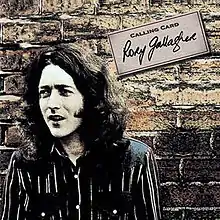| Calling Card | ||||
|---|---|---|---|---|
 | ||||
| Studio album by | ||||
| Released | October 1976 | |||
| Recorded | September 1976 | |||
| Studio | Musicland Studios, Munich | |||
| Genre | Blues rock, hard rock, folk rock | |||
| Length | 45:14 (original release) 54:03 (1999 remaster) | |||
| Label | Chrysalis Buddah (remaster) | |||
| Producer | Roger Glover, Rory Gallagher | |||
| Rory Gallagher chronology | ||||
| ||||
Calling Card is the sixth studio album and eighth album overall by Irish singer/guitarist Rory Gallagher. A 1976 release, it was his second of four albums released on Chrysalis Records in the 1970s. Deep Purple/Rainbow bass guitarist Roger Glover co-produced with Gallagher: it was the first time that Gallagher worked with a "name" producer and the only successful such collaboration.[1] It was also the last album Gallagher would do with Rod de'Ath (drums) and Lou Martin (keyboards). After Calling Card, Gallagher retained only his long-time bass guitarist Gerry McAvoy and hired Ted McKenna on drums. This revised power trio was Gallagher's line up for the next five years.
Recording
The sessions for the album began at Musicland Studios in Munich, Germany, in the summer of 1976. Glover came on board as co-producer after having met Gallagher when the latter opened for Deep Purple on an American tour. The choice of Glover signified a conscious attempt by Gallagher to try new directions from the hard rock he was best known for. Calling Card is one of his most diverse albums. It also reflects the synergy that the band had developed after years of playing together. As producer Roger Glover commented “they all seemed very dedicated to Rory, there was an allegiance, born of years of smoky clubs and endless journeys”.[2] This was the fifth and last release featuring this line-up.
Reaction
| Review scores | |
|---|---|
| Source | Rating |
| Allmusic | |
| Rolling Stone | (not rated)[4] |
| sputnikmusic | |
The album is often considered one of Gallagher's finest studio offerings with Allmusic giving the album 4.5 stars out of 5.[6] In its August 2005 issue, Guitar Player's "Oeuvre Easy" feature on Gallagher praised its "brilliant songs" and "rockin' edge" and listed it in the "Inspired" section of his catalogue.[7] Irish folk group The Dubliners later covered "Barley And Grape Rag" on their 1992 release, 30 Years A-Greying.
1999 remaster
The album was reissued by Buddah Records in 1999 along with the rest of Gallagher's catalogue. As with the rest of the reissues, the album featured remastered sound, newly written liner notes by Gallagher's brother Donal, and bonus tracks "Rue the Day" and "Public Enemy" (an early version of a track that later appeared on Gallagher's 1979 album Top Priority).
Track listing
All tracks composed by Rory Gallagher.
| No. | Title | Length |
|---|---|---|
| 1. | "Do You Read Me" | 5:20 |
| 2. | "Country Mile" | 3:18 |
| 3. | "Moonchild" | 4:48 |
| 4. | "Calling Card" | 5:24 |
| 5. | "I'll Admit You're Gone" | 4:25 |
| No. | Title | Length |
|---|---|---|
| 6. | "Secret Agent" | 5:45 |
| 7. | "Jack-Knife Beat" | 7:04 |
| 8. | "Edged in Blue" | 5:31 |
| 9. | "Barley and Grape Rag" | 3:39 |
| No. | Title | Length |
|---|---|---|
| 10. | "Rue the Day" | 4:14 |
| 11. | "Public Enemy (B-Girl Version)" | 4:35 |
| No. | Title | Length |
|---|---|---|
| 10. | "Where Was I Going to?" | 5:27 |
Personnel
- Rory Gallagher – vocals, guitar and harmonica
- Gerry McAvoy – bass guitar
- Lou Martin – keyboards
- Rod de'Ath – drums
- Technical
- Hans Menzel, Mack – engineer
References
- ↑ The only other attempt was the failed next album. Gallagher tried letting Elliot Mazer produce in San Francisco. After the album was finished Gallagher scrapped it and fired most of his band. The Mazer versions of these songs were posthumously released as Notes From San Francisco.
- ↑ Gallagher, Donal. "Calling Card Liner Notes". www.rorygallagher.com. Retrieved 11 June 2013.
- ↑ Calling Card at AllMusic
- ↑ Milward, John (2 December 1976). "Rory Gallagher: Calling Card : Music Reviews : Rolling Stone". Rolling Stone. Archived from the original on 14 February 2009. Retrieved 2 October 2012.
- ↑ g, manos (29 August 2013). "Review: CD Rory Gallagher - Calling Card Album". Sputnikmusic. Retrieved 8 November 2013.
- ↑ Horowitz, Hal. "Rory Gallagher Calling Card". Allmusic.com. Retrieved 11 June 2013.
- ↑ Molenda, Michael (1 August 2005). "Oeuvre easy: Rory Gallagher". Guitar World.